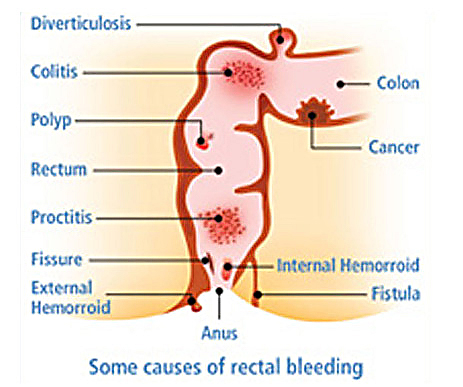
1. Rectal bleeding is the passage of blood through the anus.
2. Rectal bleeding may be red, maroon, black or occult.
3. The common causes of rectal bleeding include anal fissure, hemorrhoids, diverticulosis, colon cancer and polyps, post-polypectomy, angiodysplasias, colitis and proctitis, and Meckel's diverticula. Rectal bleeding also may be seen with bleeding that is coming from the stomach, duodenum, or small intestine.
4. The origin of rectal bleeding is determined by history and physical examination, anoscopy, flexible sigmoidoscopy, colonoscopy, radionuclide scans, visceral angiograms, and blood tests.
5. Rectal bleeding is treated by correcting the low blood volume and anemia, determining the site and cause of the bleeding, stopping the bleeding, and preventing rebleeding.
What does rectal bleeding (blood in stool) mean?
Rectal bleeding (known medically as hematochezia) refers to the passage of red blood from the anus, often mixed with stool and/or blood clots. (It is called rectal bleeding because the rectum lies immediately above the anus, and although red blood in the stool indeed may be coming from the rectum, as discussed later, it also may be coming from other parts of the gastrointestinal tract.) The severity of rectal bleeding (i.e., the quantity of blood that is passed) varies widely. Most blood in the stool or rectal bleeding are mild and stop on their own. Many patients report only passing a few drops of fresh blood that turns the toilet water pink or observing spots of blood on the tissue paper. Others may report brief passage of a spoonful or two of blood. Generally, mild rectal bleeding can be evaluated and treated in the doctor's office without hospitalization or the need for urgent diagnosis and treatment.
Bleeding also may be moderate or severe. Patients with moderate bleeding will repeatedly pass larger quantities of bright or dark red (maroon-colored) blood often mixed with stools and/or blood clots. Patients with severe bleeding may pass several bowel movements or a single bowel movement containing a large amount of blood. Moderate or severe rectal bleeding can quickly deplete a patient's body of blood, leading to symptoms of weakness, dizziness, near-fainting or fainting, and signs of low blood pressure or orthostatic hypotension (a drop in blood pressure when going from the sitting or lying position to the standing position).
Rarely, the bleeding may be so severe as to cause shock from the loss of blood. Moderate or severe rectal bleeding usually is evaluated and treated in the hospital. Patients with signs and symptoms of reduced volume of blood often require emergency hospitalization, and transfusion of blood.